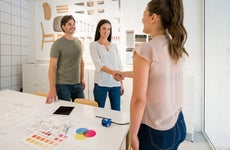What is an online interior design service?

The Bankrate promise
At Bankrate we strive to help you make smarter financial decisions. While we adhere to strict , this post may contain references to products from our partners. Here's an explanation for .
Just about every sort of service is online these days, and that includes interior design. Once the province of professionals who came into your home or home-to-be and advised on room arrangement, flow and decor, interior design has gone virtual: Companies such as Decorist, Havenly and Modsy offer advice and recommendations with nary a physical meeting or view of your space in sight.
Their existence makes access to an experienced interior designer easier and less expensive than ever. But how can a traditional in-person service work remotely? And what are you really getting for the money?
How do online interior design services work?
Some interior design services are run by independent, online firms or businesses. Others are owned by furniture companies and retailers like Wayfair. Still others are run by individual interior designers who contract their services on a freelance basis (and work both in person and virtually).
The online design process
Working with an online interior design service starts with you sharing your goals for your space and design taste — and budget. Most companies provide a series of photos for you to choose from to impart a sense of your style; some companies also ask you to upload inspiration photos (rooms from catalogs or another source that you love). With smaller companies and independent designers, you may directly go to communicating directly with a real person. With bigger interior design companies, you may have to go through a series of automated quizzes or questionnaires before being assigned a designer.
Once you select the type of room you’re working on, you must do some homework: Take and upload measurements, photos and sketches of your space. Gathering these dimensions can be a little onerous. In a post detailing her experience with Modsy, Lela Burris, writer behind the blog Organized-ish, describes her efforts to create a 3D model for the firm: “It’s hard to walk the perimeter of a bedroom keeping the phone facing the center as I climb over beds and chairs and weave around cat trees. Eventually I either got it right or the app felt sorry for me because it said I could stop.”
Then comes the active design phase: Your assigned designer recommends personalized ideas and inspirations to you, providing suggestions on furniture, decor and even how to arrange each item. You’re usually allowed a set number of sessions and/or concepts, and you can work together through email, phone or video conference.
Certain companies, such as Havenly, offer a 3D look at what your home will look like with the selected decor; some, like Modsy, even let you play with the 3D software itself, changing colors and furnishings and their placement.
After the final selections are made, you can order the furniture directly from the designer, and it is shipped to your home.
How much do online interior design services cost?
Though some online interior design services charge an hourly rate (as traditional in-person designers tend to do), most bundle their services in flat-rate packages. Ranging from $99 to $1,300, these packages are tier-based, and the more inclusive the package, the higher the rate.
For example, Modsy offers three packages. The basic one is for $179/room and is suggested for simple projects. It includes a 3D rendering of a single room and unlimited design revisions. The next package starts at $299 and is recommended across two or more rooms. The top Luxe package starts at $499 and offers unlimited video calls with the firm’s most seasoned designers, along with discounts on furniture purchases.
For a few dollars more, some companies, such as Havenly and Decorilla, even offer in-person consultations in some cities.
Advantages of online interior design services
Choosing an online interior designer offers some benefits.
Less expensive
Though exact comparisons can be tough, due to different pricing methods, you can save a substantial amount of money with an online designer. In-person designers can charge as much as $200 an hour or $2,000 a room (or more); the virtual designers’ package rates tend to be much lower, and they often offer discounts for additional rooms.
Convenience
The virtual process allows you to connect easily and quickly — no need to juggle schedules or work out a time when you both can be at the home site. Most services work fast, too, providing designs in days or weeks; an in-demand individual designer could be booked for months.
Accessibility
These services make interior design available to folks in remote areas, or places where a good choice of experienced designers may be highly limited. And if you’re unhappy with your paired designer, many services will assign you a new one; no need to start looking for a new pro.
One-stop shopping
There’s no obligation to buy, but if you like the furnishings they pick out, it’s easy to order from the service.
Disadvantages of online interior design services
An online interior designer may be a great option for some, but there are a few downsides to consider.
Limited view
Some might argue that there’s no substitute for an interior designer standing in your home and seeing your space, taking in the view, the light, the flow and “feel” of the rooms. Or, once you get down to work, for a professional measuring and mapping and figuring dimensions. The scrambling around clients have to do, taking photos and making sketches — shouldn’t that be part of the designer’s job? What if you miscalculate?
Fixed services
Though some online designer packages promise unlimited consults or revisions, most are limited, and the companies hold you tightly to their parameters (three design concepts, two conferences, etc.). Also, some online services don’t work with unbuilt spaces or advise on the layout of pipes, wiring or HVAC — functions that interior designers are traditionally trained to do and which distinguish them from interior decorators, who basically just furnish rooms.
Too-cozy relationships
Most sites don’t require you to purchase furniture directly from them. (If one does, let your fingers do the walking — to another service.) But there may be a hard sell — yes, the designer gets compensated via commission, in many cases — and in cases where the service is owned by a furnishings retailer, you might wonder about the provided options.
The final word on online interior design services
To some, online interior design services may just seem like decorators trying to sell you stuff. Admittedly, their services are more limited than those of traditional interior designers, which mitigates the value of their lower prices. Still, an online service can be a convenient option for those seeking room-furnishing help without a lot of time or money. Even if you do have an eye for decor, it never hurts to get advice and ideas from a pro.
Related Articles




What’s the difference between an interior designer and an interior decorator?